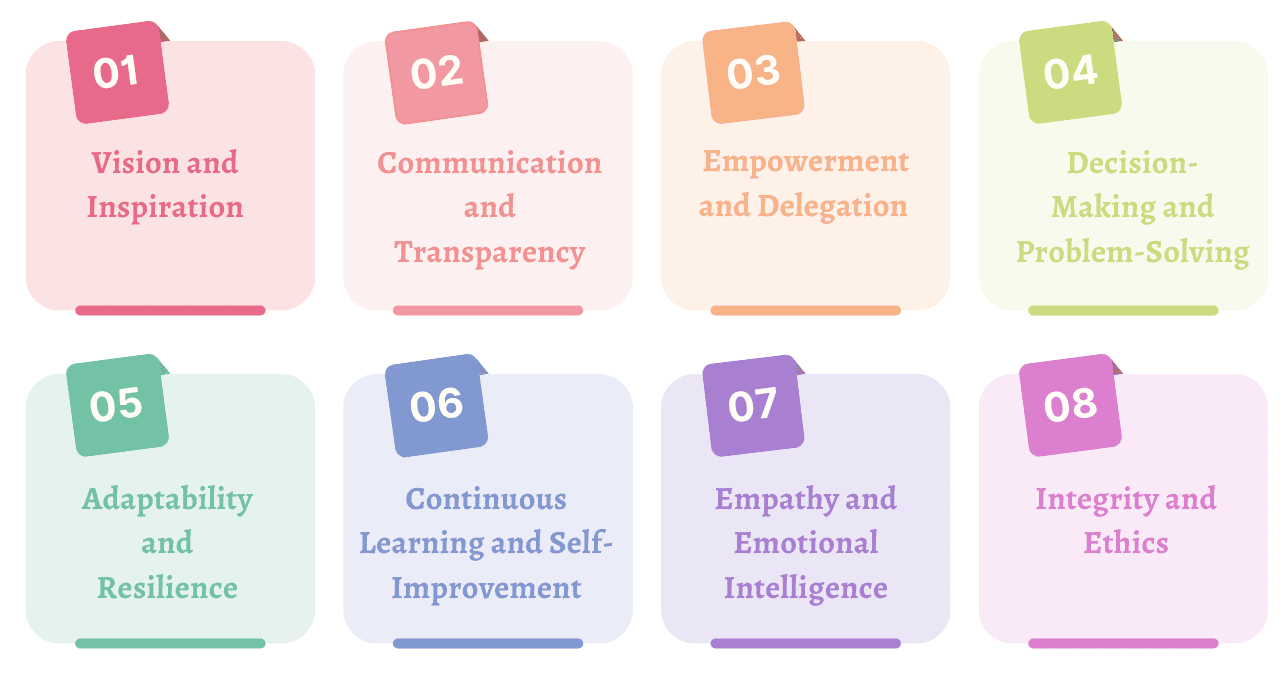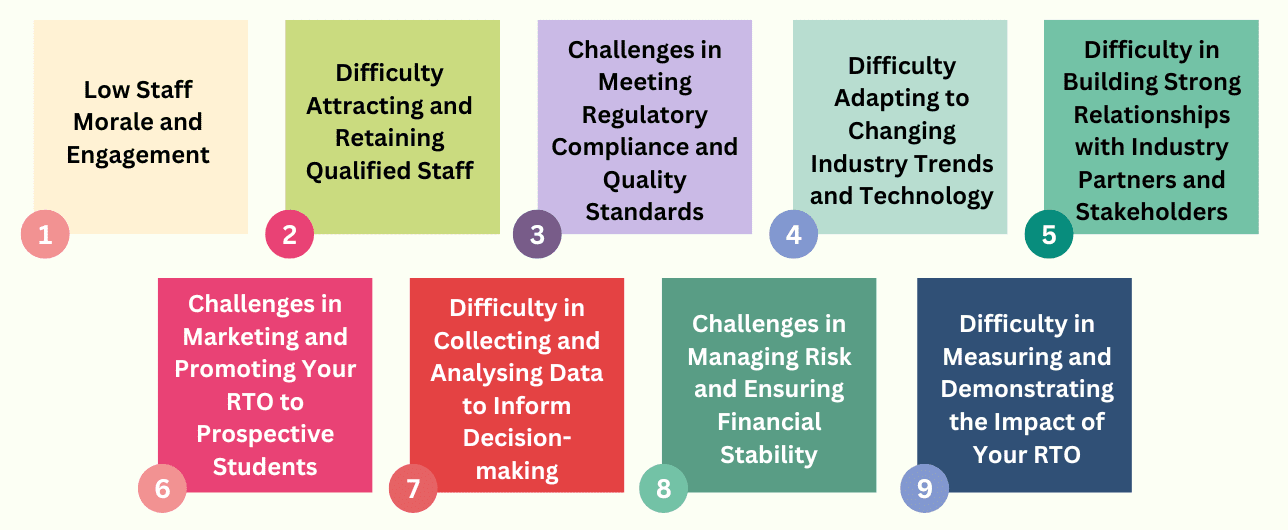Home » The Essence of Effective Leadership: Traits and Qualities That Matter

Running an RTO is no easy feat. A leader’s job is to handle this complex, multifaceted role requiring strategic thinking, operational expertise, and strong leadership skills. RTO CEOs must be able to navigate a constantly changing regulatory landscape, manage a team of diverse professionals, and ensure that their organisation meets the needs of students, industry partners, and stakeholders. They must also be able to foster a culture of innovation and continuous improvement, and they must be able to make tough decisions when necessary.
It is essential to understand what leadership is. Assessing and finding out what kind of leader you are vital. And if you are already seeing problems arising, you can solve them by changing how you handle the issues in your RTO.
Today, we will introduce you to effective leadership. It’s not a new term, but this blog will tell you how to become an effective leader.
Effective leadership is the cornerstone of success in the dynamic Registered Training Organisations (RTOs) world. It’s the driving force behind a thriving organisation, propelling it towards achieving its goals and positively impacting the lives of its students, staff, and the wider community.
Effective leadership is not just about titles or positions; it’s about embodying qualities that inspire, empower, and unite people towards a common purpose. It’s about creating an environment where individuals feel valued, respected, and motivated to contribute their best.
Effective leadership is a catalyst for organisational growth and success. It fosters a culture of innovation, collaboration, and continuous improvement, enabling RTOs to adapt to the ever-changing landscape of vocational education and training.
In simple words, effective leadership is the ability to successfully influence and support a team or group of people. This means that effective leaders are able to inspire and motivate others to work towards common goals, while also providing them with the support they need to succeed. Effective leaders are also able to create a positive and productive work environment, where people feel valued and respected.
So, it is important to know about the traits of an effective leader.
Effective leadership is not a one-size-fits-all formula. There is no single set of traits or qualities that guarantee success. However, specific characteristics are common among influential leaders. These qualities can be learned and developed over time, and they can make a significant difference in the success of an RTO.

Effective leaders possess a clear and compelling vision for the future of their RTOs. Their ability to articulate this vision in an inspiring and achievable manner sets the tone for the organisation’s direction and motivates team members to work towards shared goals.
Effective leaders are masters of communication, and adept at conveying information concisely and thoughtfully, both verbally and in writing. They foster a culture of transparency, openly sharing information with their team members and stakeholders.
Effective leaders recognise the power of empowerment, trusting their team members to make informed decisions and take ownership of their work. They delegate tasks effectively, ensuring people do the right job at the right time.
Effective leaders can make sound decisions under pressure, carefully weighing various options and choosing the action that best aligns with the RTO’s goals. They are also adept at problem-solving, identifying the root causes of issues and devising practical solutions.
Effective leaders can adjust their plans and strategies in response to changing circumstances. They bounce back from setbacks with determination, keeping the organisation forward despite challenges.
Effective leaders embrace lifelong learning, constantly seeking opportunities to enhance their skills and expand their knowledge. They are open to feedback and willing to make adjustments based on constructive criticism.
Effective leaders demonstrate empathy and emotional intelligence, understanding the feelings of others and responding with compassion and support. They manage their own emotions effectively, preventing emotions from clouding their judgment.
Effective leaders uphold the highest integrity and ethical conduct standards. They are honest and transparent in their dealings, committed to keeping the values of the RTO and setting a positive example for others.
While the traits of influential RTO leaders may vary, some overarching strategies and principles can guide individuals and organisations towards excellence in leadership. By adopting these practices, RTO CEOs can foster a thriving work environment and cultivate a culture of innovation, collaboration, and continuous improvement.
Clearly articulate the RTO’s vision, ensuring all team members understand and align with the organisation’s goals. Encourage active participation from staff in shaping the vision and setting objectives.
Encourage open and transparent communication at all levels of the organisation. Create channels for feedback and ensure that team members feel comfortable sharing their ideas and concerns.
Trust your team members to make decisions and take ownership of their work. Delegate tasks effectively, providing support and guidance when needed.
Encourage a culture of continuous learning and professional development. Invest in training and development opportunities for staff and encourage them to attend industry events and conferences.
Celebrate individual and team accomplishments. Implement a system of recognition and rewards to motivate and inspire staff members. Acknowledge their hard work, contributions, and successes, both big and small. It fosters a culture of appreciation, boosts morale, and encourages continued high performance.
Actively seek feedback from your team members, industry partners, and stakeholders. Be open to constructive criticism and use it to identify areas for improvement. Embrace Change as an opportunity for growth and development, adapting your leadership approach and the organisation’s strategies accordingly.
Set the tone for the organisation by demonstrating the leadership qualities you aspire to cultivate in others. Exhibit integrity, honesty, empathy, and a commitment to continuous learning. Your actions will speak louder than words, inspiring your team members to follow suit.
Identify individuals within your organisation who possess leadership potential. Invest in their development, providing them mentorship, coaching, and opportunities to take on leadership roles. It ensures a pipeline of future leaders who can carry the torch and sustain the organisation’s success.
Effective leadership is not just a desirable quality; it’s a driving force behind organisational success. By embracing the traits, strategies, and principles of effective leadership, RTO CEOs can create a thriving organisation that achieves its goals and positively impacts the world.
Influential leaders foster a positive and supportive work environment where staff members feel valued, respected, and motivated to contribute their best. It leads to increased engagement, higher productivity, and reduced employee turnover.
Effective leaders promote open and transparent communication, breaking down silos and fostering a culture of collaboration. It enhances teamwork, innovation, and problem-solving, leading to better outcomes for the organisation.
Influential leaders empower their team members, giving them the autonomy, resources, and support they need to succeed. It increases motivation, ownership, and a sense of accomplishment among staff members.
Effective leadership in RTOs translates into better student outcomes. A well-led organisation is more likely to deliver high-quality education, provide adequate support services, and prepare students for successful careers.
Effective leaders cultivate strong relationships with industry partners, government agencies, and other stakeholders. This enhances the RTO’s reputation, opens doors to funding and resources, and strengthens its position in the industry.
Effective leadership leads to improved financial performance. A well-managed RTO is more likely to attract students, secure funding, and operate efficiently, leading to increased revenue and financial stability.
Now that you know the traits, impact, Strategies and Principles of effective leadership, how are you going to use them in challenges faced while managing an RTO? Let’s see how.

At VET Resources we offer the highest quality training materials. Our materials are made by subject matter experts and are relevant to current industry standards. For more information contact us here.
As RTO CEOs, you hold the reins of shaping the future of your organisation and the lives of your students. By embracing the principles and practices of effective leadership, you can transform your RTO into a thriving hub of innovation, excellence, and positive impact.
Effective leadership is not a mere set of skills; it’s a mindset, a commitment to continuous growth, and a deep understanding of human potential. It’s about inspiring and empowering others to reach their full potential, while also navigating the complexities of the vocational education and training landscape.
By cultivating effective leadership, you can foster a culture of collaboration, innovation, and success within your RTO. You can attract and retain top talent, build strong relationships with industry partners, and deliver exceptional education that empowers students to achieve their career aspirations.
Remember, effective leadership is not a destination but a journey of continuous learning and self-improvement. Embrace the challenges, learn from your experiences, and never lose sight of the profound impact you can have as an RTO CEO. Together, we can shape the future of vocational education and training, creating a world where every individual has the opportunity to thrive and succeed.
What are the 5 Cs of effective leadership?
The 5 Cs of Effective Leadership are Credibility, Communication, Commitment, Confidence and Creativity.
What are the 5 Ps of effective leadership?
The 5 Ps of Effective Leadership are Passion, Purpose, People, Process and Persistence.
Disclaimer:
The information presented on the VET Resources blog is for general guidance only. While we strive for accuracy, we cannot guarantee the completeness or timeliness of the information. VET Resources is not responsible for any errors or omissions, or for the results obtained from the use of this information. Always consult a professional for advice tailored to your circumstances.
Ben Thakkar is a Compliance, Training, and Business specialist in the education industry. He has held senior management roles, including General Manager, with leading Registered Training Organisations (RTOs) and Universities. With over 15 years of experience, Ben brings extensive expertise across audits, funding contracts, VET Student Loans, CRICOS, and the Standards for RTOs 2025.
Ben Thakkar Linkedin
By submitting this form, you agree to the VET Resources Privacy Policy.